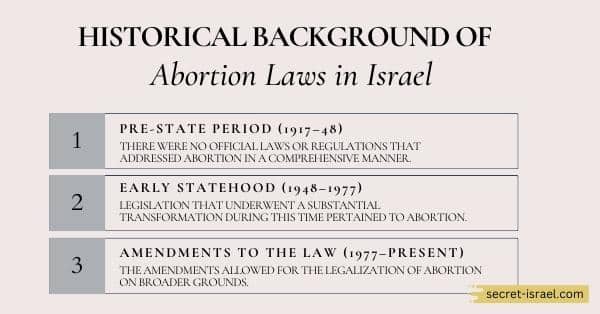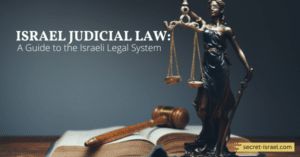Abortion in Israel is legal under certain circumstances, such as rape, risk to the mother’s life, or severe fetal abnormalities. The decision must be approved by a committee of doctors, and the procedure can only be performed by licensed physicians in authorized medical facilities. However, societal stigma and ongoing debates contribute to the complexity of the issue.
In this blog post, we’ll explore the complexities of abortion law in Israel, including the requirements for obtaining an abortion and how society views it. We’ll also examine some of the challenges that exist in accessing abortion services and how they can affect women’s health. Read on to find out more about the legalities and implications of abortion in Israel.
Overview of Abortion Laws in Israel
Abortion laws in Israel have been a topic of debate for decades. Many people are unsure if abortion is legal in the country, and if so, to what extent. The truth is that abortion is legal in Israel under certain circumstances.
In 1977, the Israeli Knesset passed a law allowing for abortion under certain conditions, including rape, the mother’s life being in danger, and if the child would be born with a severe medical condition. However, abortions are only allowed up to 24 weeks into the pregnancy, and the decision must be approved by a committee of doctors.
Despite these laws, the topic of abortion remains controversial in Israeli society, with some advocating for more liberal policies and others opposing any further changes to the existing laws.

Historical Background of Abortion Laws in Israel

Pre-State Period (1917–48)
At the time, there were no official laws or regulations that addressed abortion in a comprehensive manner. However, the Jewish community, which made up the majority of the population, adopted the traditional halakhic approach to abortion, which only allowed it in extremely limited circumstances.
The British Mandate authorities, who governed the region, also had their own stance on abortion, which was largely influenced by the dominant views in the Western world at the time. As a result, abortion was a contentious issue in the region, and the debate over how to regulate it continued well into the period after Israel’s establishment as a state in 1948.
Understanding the historical background of abortion laws in Israel during the Pre-State Period is essential to comprehending the current state of affairs and the policies that guide public discourse on the matter today.
Early Statehood (1948–1977)
One area of legislation that underwent a substantial transformation during this time pertained to abortion. Prior to 1977, the Israeli government had banned all abortions except in cases in which the mother’s life was in danger or if the pregnancy resulted from rape or incest.
However, as societal views evolved and women’s rights became increasingly important, the government began to reevaluate its position on abortion.
In 1977, new legislation was passed, legalizing abortion for women under certain circumstances, including when the pregnancy was the result of a crime when the pregnancy endangered the mother’s physical or mental well-being, or when carrying the pregnancy to term would pose a threat to the child’s health.
This change in law marked a pivotal moment in Israel’s history and demonstrated the impact of evolving societal attitudes on legal decision-making.
Amendments to the Law (1977–present)
This pivotal moment in Israeli history marks the year when significant changes were made to the country’s abortion laws. Prior to this, termination of pregnancy was legal only in cases where a woman’s life was in danger or in instances where the fetus was a product of rape or incest.
However, the amendments allowed for the legalization of abortion on broader grounds. Today, women in Israel are allowed to undergo an abortion if they are at risk of physical or mental harm if the fetus carries serious medical issues or in cases of statutory rape or abuse.
The idea behind these amendments was to give women greater reproductive rights and control over their own bodies, and it has been a much-contested and debated issue ever since.
Regulations and Requirements for Legal Abortions
Abortion laws around the world can vary greatly, with some countries strictly prohibiting the practice, while others allow it in certain circumstances. In Israel, abortions are legal but are subject to specific regulations and requirements.
- She is under 18 or over 40 (cost to those in between 1,500 shekels [$370]).
- She carries a fetus with a severe mental or physical defect (free).
- She claims that the fetus results from forbidden relations such as rape or incest (free) or, in the case of a married woman, that the baby is not her husband’s (not free). Single women also fall under this clause, and they too must pay.
- She shows that her physical or mental health would be harmed by continuing the pregnancy (free).
Additionally, the procedure can only be performed in authorized medical facilities by licensed physicians who have undergone specialized training. These regulations ensure that women who choose to terminate a pregnancy do so safely and with proper medical care.

Unpacking the Societal and Political Discourse on Abortion in Israel
Abortion in Israel is legally permitted when approved by a termination committee, and the approval process was eased to increase accessibility. However, the societal stigma surrounding the topic persists, making it challenging to openly discuss.
Politically, abortion rights in Israel are considered secure, despite ongoing debates and opposition to potential restrictions. Overall, while Israel has a relatively liberal approach to abortion, it remains a complex issue that encompasses legal, societal, and political dimensions.

In conclusion
The topic of abortion legality in Israel is a complex and nuanced issue, as our investigation has revealed. While abortion is technically legal in Israel, there are some significant restrictions and controversies surrounding it.
Religion, politics, and gender play important roles in shaping attitudes towards abortion, both within Israel and on the global stage. As our exploration of this topic shows, there are many factors to consider when trying to understand the realities of abortion in Israel.
It is important to approach the issue with an open mind and a willingness to learn. Ultimately, it is clear that the complicated nature of this topic calls for continued research and discussion in order to understand and address the various perspectives and concerns involved.












